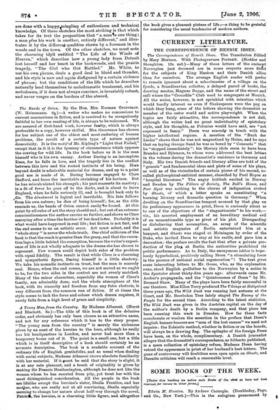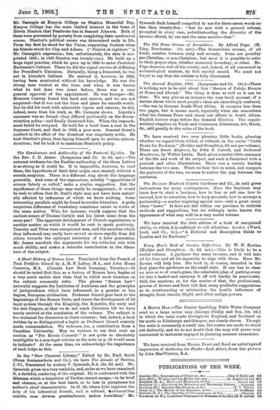SOME BOOKS OF THE WEEK.
[Under this heading is notice slugs Book, of the aka as have not been reserved for review in other forms,] Edwin M. Stanton. By Andrew Carnegie. (Doubleday, Page, and Co., New York.)—This is the enlogium pronounced by
Mr. Carnegie at Kenyon College on Stanton Memorial Day. Kenyon College has the same limited interest in the fame of Edwin Stanton that Pembroke has its Samuel Johnson. Both of them were prevented by poverty from completing their academical course. Stanton's political career was determined early in life. From the first he stood for the Union, supporting Jackson when his friends stood for Clay and Adams. (" Patriot at eighteen " is Mr. Carnegie's expression ; but, unfortunately, the date is mis- printed 1825 ; in 1835 Stanton was twenty-one.) He built up a large legal practice, which he gave up in 1860 to enter President Buchanan's Cabinet. There he did the signal service of stiffening the President's Unionism. Naturally, being a Democrat, he was not in Lincoln's Cabinet. He entered it, however, in 1862, having been nominated without his knowledge. He was the strong man wanted at the time, and when it was known what he had done two years before, there was a very general approval of the appointment. He was brusque—Mr. Moncure Conway found him hard and narrow, and we are not surprised—but it was not the time and place for smooth words. But he did his work with admirable vigour and success; he did, indeed, more than his work, as Mr. Carnegie shows. Lincoln's successor was no friend—they differed profoundly on the Recon- struction policy—and finally dismissed him. When the impeach- ment failed he resigned. He held for a brief time a seat in the Supreme Court, and died in 1869, a poor man. General Grant's conduct in the affair of the dismissal was singularly noble. He took Stanton's place, thus laying himself open to serious miscon- struction; but he took it to maintain Stanton's policy.







































 Previous page
Previous page